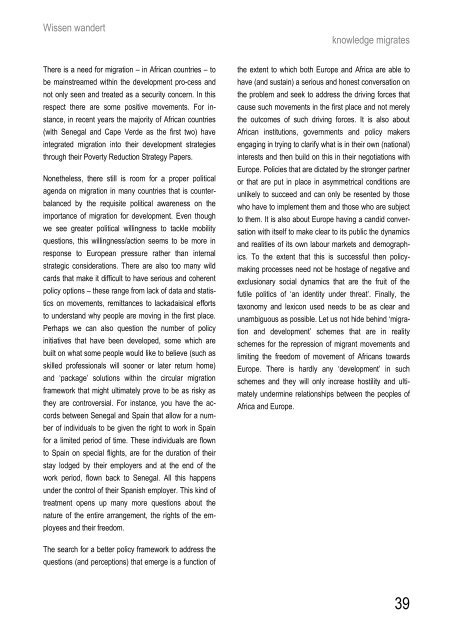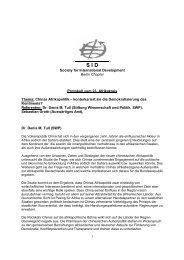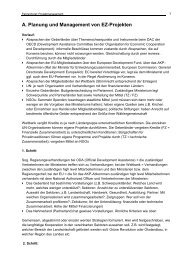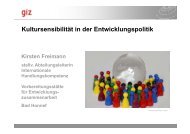Konferenzbericht (PDF-Dokument, 3 MB) - SID
Konferenzbericht (PDF-Dokument, 3 MB) - SID
Konferenzbericht (PDF-Dokument, 3 MB) - SID
Sie wollen auch ein ePaper? Erhöhen Sie die Reichweite Ihrer Titel.
YUMPU macht aus Druck-PDFs automatisch weboptimierte ePaper, die Google liebt.
Wissen wandert<br />
There is a need for migration – in African countries – to<br />
be mainstreamed within the development pro-cess and<br />
not only seen and treated as a security concern. In this<br />
respect there are some positive movements. For in-<br />
stance, in recent years the majority of African countries<br />
(with Senegal and Cape Verde as the first two) have<br />
integrated migration into their development strategies<br />
through their Poverty Reduction Strategy Papers.<br />
Nonetheless, there still is room for a proper political<br />
agenda on migration in many countries that is counter-<br />
balanced by the requisite political awareness on the<br />
importance of migration for development. Even though<br />
we see greater political willingness to tackle mobility<br />
questions, this willingness/action seems to be more in<br />
response to European pressure rather than internal<br />
strategic considerations. There are also too many wild<br />
cards that make it difficult to have serious and coherent<br />
policy options – these range from lack of data and statis-<br />
tics on movements, remittances to lackadaisical efforts<br />
to understand why people are moving in the first place.<br />
Perhaps we can also question the number of policy<br />
initiatives that have been developed, some which are<br />
built on what some people would like to believe (such as<br />
skilled professionals will sooner or later return home)<br />
and „package‟ solutions within the circular migration<br />
framework that might ultimately prove to be as risky as<br />
they are controversial. For instance, you have the ac-<br />
cords between Senegal and Spain that allow for a num-<br />
ber of individuals to be given the right to work in Spain<br />
for a limited period of time. These individuals are flown<br />
to Spain on special flights, are for the duration of their<br />
stay lodged by their employers and at the end of the<br />
work period, flown back to Senegal. All this happens<br />
under the control of their Spanish employer. This kind of<br />
treatment opens up many more questions about the<br />
nature of the entire arrangement, the rights of the em-<br />
ployees and their freedom.<br />
The search for a better policy framework to address the<br />
questions (and perceptions) that emerge is a function of<br />
knowledge migrates<br />
the extent to which both Europe and Africa are able to<br />
have (and sustain) a serious and honest conversation on<br />
the problem and seek to address the driving forces that<br />
cause such movements in the first place and not merely<br />
the outcomes of such driving forces. It is also about<br />
African institutions, governments and policy makers<br />
engaging in trying to clarify what is in their own (national)<br />
interests and then build on this in their negotiations with<br />
Europe. Policies that are dictated by the stronger partner<br />
or that are put in place in asymmetrical conditions are<br />
unlikely to succeed and can only be resented by those<br />
who have to implement them and those who are subject<br />
to them. It is also about Europe having a candid conver-<br />
sation with itself to make clear to its public the dynamics<br />
and realities of its own labour markets and demograph-<br />
ics. To the extent that this is successful then policy-<br />
making processes need not be hostage of negative and<br />
exclusionary social dynamics that are the fruit of the<br />
futile politics of „an identity under threat‟. Finally, the<br />
taxonomy and lexicon used needs to be as clear and<br />
unambiguous as possible. Let us not hide behind „migra-<br />
tion and development‟ schemes that are in reality<br />
schemes for the repression of migrant movements and<br />
limiting the freedom of movement of Africans towards<br />
Europe. There is hardly any „development‟ in such<br />
schemes and they will only increase hostility and ulti-<br />
mately undermine relationships between the peoples of<br />
Africa and Europe.<br />
39







